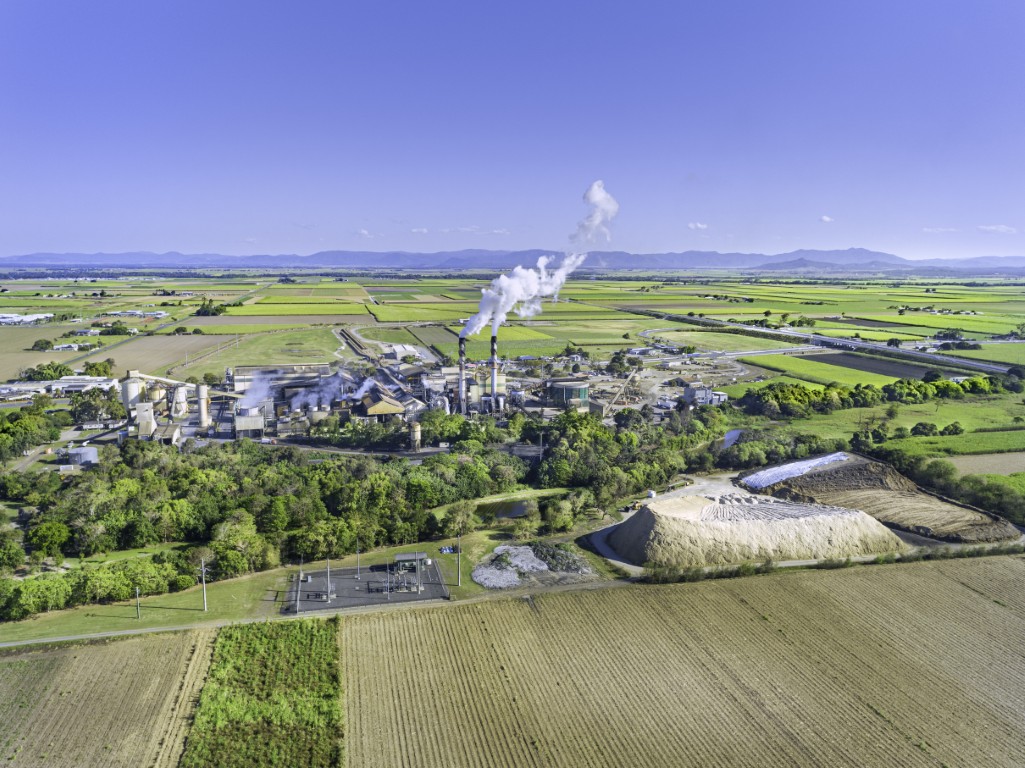


In the heart of Queensland’s sugar capital, Mackay Sugar’s Racecourse Mill’s 38MW co-generation plant, commissioned in 2012, is a testament to regional innovation and sustainability.
This state-of-the-art facility, which burns sugarcane waste known as bagasse to generate clean, green, renewable energy. Bagasse is a fibrous residue left after juice extraction from sugarcane. At the co-gen process core is the factory’s boilers which burn the bagasse as a primary fuel source to produce steam to power not only the mill, but also in turn drives turbines to generate electricity and now supplies over 30% of Mackay and district’s electricity requirements.
It has become a keystone of the Mackay sugar industry’s commitment to greener industry and economic resilience. It exemplifies how industry and environment can thrive side by side, whilst still benefiting the wider Mackay community.
The plant’s ability to annually utilise some 220,000 tonnes of by-product indicates that Mackay’s sugar industry has for many years operated as a circular economy. By converting bagasse into clean energy, Mackay Sugar reduces greenhouse gas emissions, making its own positive environmental impact to Australia’s renewable energy targets. When the plant was established, it was a piece of forward thinking by a then grower-owned milling company, responsive to the early shift towards reducing its carbon footprint that has become more commonplace only 15 years later.
Bagasse is a renewable and locally sourced feedstock, its use as fuel reduces the reliance on fossil fuels, thus reducing carbon emissions. The closed-loop nature of the process ensures that the majority of sugarcane’s energy is recaptured and reused, further enhancing sustainability and helps to stabilise the local ecosystem. This proactive approach which has been in place for many years to waste management sets a benchmark for other industries seeking to shrink their environmental footprint.
Beyond its environmental achievements, the Mackay Sugar co-generation plant delivers substantial economic benefits by reducing operating costs for the sugar mills, supporting both profitability and job security in the region. Surplus electricity sales provide an additional revenue stream, strengthening Mackay Sugar’s financial health and enabling further investment in the factories and therefore benefiting the wider community.
Furthermore, the plant continues to create local job creation, both through plant operations and maintenance as well as indirectly via associated supply chain services. This has cemented Mackay’s status as a regional hub for both agriculture and advanced energy technology and should pave the road forward for further similar projects not only in Mackay, but throughout the wider sugar industry. It is a model of sustainable progress. By transforming agricultural waste into clean power, the plant demonstrates the potential of smart, circular solutions to energise regional economies, protect the environment, and power a greener future for generations to come.
As this article goes to print, Mackay Canegrowers will have participated in the Queensland Government inquiry into Sugarcane Bio-Energy opportunities, which held a consultation session at Souths Leagues Club this week. The aim of the inquiry is to identify future opportunities in bio-energy production and create a roadmap to further help secure the future viability of the sugar industry as a whole.
With the assistance of state government, and some changes in legislation going forward, we believe that there are tremendous opportunities for growers, in particular. Such opportunities could include innovative ideas on electricity retailing. We are calling for regulation enabling growers to access cheaper electricity for irrigation, via a virtual microgrid arrangement with Mackay Sugar and therefore increasing production for the growers and enhanced throughput for the factories. It allows a value-add for growers to be able to access cheaper electricity sourced from their own product: sugarcane. Moreover, irrigation offers benefits for the environment, reducing runoff by improving nutrient uptake and water use efficiency.
A more efficient industry will, in turn, benefit the wider community. It must be remembered that for every dollar produced at the farm gate, the flow on effects to the wider community is around $6.40. This is of major benefit to the whole Mackay economy now and into the future.
The sugar industry could build productivity without increasing actual land under cane, if irrigation were a more affordable option. Creating a microgrid with mill cogenerated power could achieve this. Photo source: Mackay Sugar (Racecourse Mill)